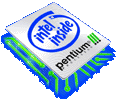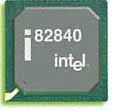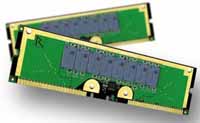Dream System
Not having to
worry about price is a luxury few people have, but it never hurts to dream up
what you would buy in such a situation. Or maybe you’ve just won the lottery.
Perhaps it’s not even your own money involved thanks to a grant or simply an
ungodly budget. Whether dreaming or actually looking to buy, putting together
the dream professional system can be a tricky, but fun, proposition. Below are
our picks for such a system.
 CPU
– Dual Pentium III 733 - $600 each
CPU
– Dual Pentium III 733 - $600 each
The CPU is probably
the most critical, as well as the most controversial, component of any system.
The old AMD versus Intel battle wages on stronger than ever before with the
Athlon and Pentium III. It’s a touchy subject among many die-hard fans of each
processor type, but for the professional dream system, we have to go with an
Intel CPU for one key reason – SMP. While the benefits of SMP vary greatly
depending on the applications in use, professional apps are generally the ones
best able to take advantage of SMP. Recently, games have begun to take some
advantage of SMP, starting with Quake 3: Arena. Now that Windows 2000 supports
SMP and DirectX7, we should begin seeing more games that are capable of using
SMP.
While Pentium III’s up to 1GHz have already been announced by Intel, don’t even waste your time trying to get a hold of one at this point. Even if they were available, Intel has actually not qualified the 1 GHz Pentium III for SMP operation according to their own site. We also decided to pass on the new Pentium III Xeon’s since the only difference between them and the standard model is the Slot-2 interface that it uses and the higher price.
The fastest readily available Pentium III is the 733 MHz model, so that’s what we’re going with. They’re currently available for just under $500 in quantities of 1000 from Intel. Unfortunately, a quick look around the web shows that Intel’s supply problems are driving up the prices here too – we saw some vendors in the lower $500, but expect to pay closer to $600 for one.
For more information on all Pentium III's, read our Pentium III 1GHz Review.
 Motherboard
– Intel OR840 - $400
Motherboard
– Intel OR840 - $400
Our choice of
dual Pentium III’s narrowed down our motherboard options very quickly. The i440BX,
i820, and i840 are the primary SMP chipsets available right now. Tyan has already
announced the Tiger 133, a dual Slot-1 board based on the VIA Apollo Pro 133A
chipset. Since it’s not available yet, it is immediately out of the running
here.
We wanted to take full advantage of the 133 MHz FSB speed of our CPU, as well as AGP 4X and Intel’s Accelerated Hub Architecture (AHA). That of course meant either the i820 or the i840. Since cost is not an object on this system, the choice was simple – the i840 since it offers the advantage of dual RAMBUS channels, which provide a total of 3.2GB/s of bandwidth. Without the cost factor holding us back, our dream system is equipped with RDRAM as well.
Of all the i840 boards out there, the OR840 from Intel is the only one that fits our requirements and is currently available. It also throws in an optional onboard Intel 82559 ethernet controller and an AGP Pro 50 slot. There is also optional AC97 audio onboard, which may be sufficient if you don’t really use sound that much in your work. But why cripple a system like this with host-based audio? We’ll disable it and add a true hardware based PCI card later.
Unfortunately, the OR840 choice means overclocking is out for now. As more i840 boards become available, we’ll revise the motherboard selection with something that will allow us to push our CPU’s.
 Memory
– 512MB PC800 RDRAM (4x128MB RIMM’s) - $4000
Memory
– 512MB PC800 RDRAM (4x128MB RIMM’s) - $4000
Not having to
worry about cost is a beautiful thing and really comes in handy when choosing
a memory type, especially since you can easily spend more on memory than most
people spend on their whole system. As such, we had no hesitation in picking
RDRAM for our dream system even though they cost $1000 for a 128MB stick. Since
we’ve got two RAMBUS channels on our OR840 motherboard, we need to install our
RIMM’s in pairs. Even without that requirement, what dream professional system
would be complete with 512MB of RAM total? Since the largest RIMM readily available
on the market today is 128MB, we need 4 sticks in order to get a total of 512MB
RAM.
 Video
card – ASUS V6800 Deluxe - $330
Video
card – ASUS V6800 Deluxe - $330
The GeForce DDR
is clearly the leading 3D graphics chipset at the moment. Not only does the
GeForce offer the only fully functional GPU in the market right now, but it
also has the highest fillrate at 480 megapixels/s. DDR SDRAM insures that you’ll
be able to reap the full benefits of the GeForce at higher resolutions and color
depths – how does 60fps gaming at 1024x768 in 32-bit color sound?
The ASUS V6800 Deluxe was also able to stand out from the crowd in our recent DDR GeForce roundup with its video capture and hardware monitoring capabilities. The video capture options speak for themselves, but the hardware monitoring enables ASUS’s Smart Doctor Utility to dynamically overclock your card, while monitoring its temperature to prevent any issues that can come with overclocking a device too far.
Being based on the NVIDIA GeForce chipset means the V6800 inherits excellent driver support under all the major OS’s. If you’re looking for a dream professional system, just drop in an ELSA GLoria II, which is based on the Quadro. The GLoria II is merely an SDR SDRAM card, and that’s the reason it doesn’t get the overall recommendation.
For more information on the ASUS V6800 Deluxe, read our DDR GeForce Roundup and our ASUS V6800 Deluxe Review.










0 Comments
View All Comments